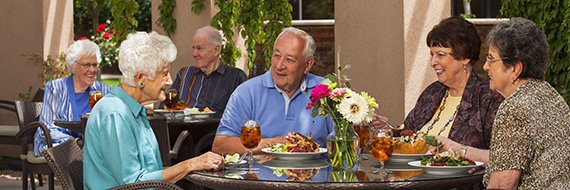Joining Gail’s Journey: Creating Comfort for People with Dementia
Gail Anderson has lived a life that can only be described as successful. She became a nurse at the age of twenty-four and raised a son and daughter as a single parent. As her children grew, so did Gail’s nursing career. She became a trusted member of the staff in the telemetry unit at the most prestigious hospital in town, where she served as a nursing supervisor and later as a nurse educator. When Gail was sixty-four, she went to work on a day she wasn’t scheduled. Although her coworkers were not alarmed, Gail was convinced something was wrong with her thinking. She made an appointment with her physician for a physical, and a short time later was diagnosed with Alzheimer’s disease.
During the five years following the Alzheimer’s diagnosis, Gail’s life changed dramatically. She relocated to two nursing homes and each time was asked to leave because her behaviors with peers were deemed intrusive. She was receiving multiple psychotropic medications, which appeared not to help. In desperation, Gail’s family reached out to the Beatitudes Campus, in Phoenix, Arizona.

Soon after Gail arrived at the Campus, the staff recognized that she was very interested in all things medical. They made note of how much she enjoyed engaging with the nurses and how often she reached out to peers in need. The staff spoke at length with Gail’s adult children and learned about her nursing career and her other interests. Included in their discussions was the wish to employ palliative care services to make Gail’s life as comfortable as possible, although at that time she was not anywhere near the end of her life.
Antipsychotic and antianxiety medications, previously found to be ineffective in curbing her intrusive behaviors, were tapered down and discontinued within two months of Gail’s arrival at the Beatitudes. Meanwhile, the staff was getting to know Gail, and felt confident they could enhance her comfort, improve her quality of life, and address the intrusiveness issue.
The following is a recap of several meetings held on Gail’s behalf:
What Does Gail Do Which Appears Intrusive to Her Peers?
- Gail will often hold the wrist of peers or touch their shoulder.
- She has sat at bedside when someone is sleeping.
- She has “borrowed” a nurse’s stethoscope to listen to someone’s heart.
What Do Gail’s Actions Mean?
Gail has a long career as a nurse and frequently associates with staff who wear scrubs. She can often be found in the nurse’s station or standing at the medication cart. She has been known to try to leave with staff at end of shift. She is especially interested in peers who are sick or frail. Gail will respond to any emergency, such as a fall, when it occurs.
What Can Staff do to Help Gail and Her Peers?
- Acknowledge and thank Gail for her service as a nurse
- Identify which peers enjoy Gail’s attention and which do not
- Help Gail to engage with peers who appreciate her attention
- Help Gail feel useful by encouraging her to “write nursing notes” or speak with other members of the nursing staff when her peers need a break
- Escort Gail on a “break” if she needs to leave the floor or before her peers can become upset with her
- Have a member of the staff distract Gail during shift change so she won’t feel the need to leave
Gail has now been a member of the Beatitudes Campus community for several years, and the staff recognizes that she is one of our greatest teachers. While there have been many lessons learned, three stand out as most important. First, Gail has helped staff better understand the connection between a behavior and what it communicates. Everything that Gail does means something. Her efforts to help, especially those she identifies as frail or sick, come from her lifetime of nursing and helping others. It is natural for her to reach out and touch her peers, actions that are not designed to be intrusive even if they are sometimes experienced that way. The staff has learned that Gail cannot be kept from nursing, even if her capacities are diminished. So, the second lesson has been to be sure Gail is engaged in activities that matter to her – in her case, nursing activities. No bingo or bridge or crossword puzzles for Gail. She is much happier sitting behind the nurse’s station with a pen and nursing note pad even if she is unable to write a note. This sort of familiar task makes sense to her.
To find opportunities to create comfort for persons living with dementia, it’s often necessary to step outside our box and into the life experiences of the person we are trying to serve.
Finally, Gail teaches us that it is possible to feel successful despite difficulty thinking due to Alzheimer’s disease or other dementias. Connecting to others as one has in the past can be a true measure of success regardless of the circumstances, and how time is spent in a meaningful way is as unique as each individual. To find opportunities to create comfort for persons living with dementia, it’s often necessary to step outside our box and into the life experiences of the person we are trying to serve. Once the Campus staff identified what they could do to help Gail, the strategies were fully implemented with all staff members. A short time later, Gail’s behaviors with peers were noted to be less intrusive. And it was evident to the staff that Gail felt successful when she was able to share her abilities with peers who could appreciate them.
Thank you, Gail, for the lessons you continue to teach us. The staff at Beatitudes Campus will not forget.
For further dementia care resources, visit CAPC's Dementia Care Curriculum, with courses and resources for both members and non-members!
